 
 Main Menu
Main Menu
|
 Nevada Classics
Nevada Classics
|
 Advertise at CC
Advertise at CC
|
 January 2025
January 2025
|
| S |
M |
T |
W |
T |
F |
S |
| |
|
|
1 |
2 |
3 |
4 |
| 5 |
6 |
7 |
8 |
9 |
10 |
11 |
| 12 |
13 |
14 |
15 |
16 |
17 |
18 |
| 19 |
20 |
21 |
22 |
23 |
24 |
25 |
| 26 |
27 |
28 |
29 |
30 |
31 |
|
|
 CC Advertisers
CC Advertisers
|
|

06-03-2006, 12:34 PM
|
|
Banned

|
|
|
Join Date: Jan 2003
Cobra Make, Engine:
Posts: 1,085
|
|

 Not Ranked
Not Ranked
 Shelby Aluminum FE Block Owners - What bore and stroke did you choose. . .
Shelby Aluminum FE Block Owners - What bore and stroke did you choose. . .
Shelby Aluminum FE Block Owners - What bore and stroke did you choose. . . and what power and torque numbers do you have?
What does your torque curve look like?
What torque are you making at 1500-4000 RPM?
What brand of crank do you have?
How hard was it to get?
If you had to do it over again, what would you change?
Thank you!
|
-
Advertising


06-03-2006, 05:27 PM
|
 |
CC Member

|
|
|
Join Date: Nov 1999
Cobra Make, Engine: ERA 739
Posts: 604
|
|

 Not Ranked
Not Ranked
I don't have an Engine for my ERA yet so I can help you.....but thanks for the question....very interested to hear the replies!!!!!!!!
Kramer
|

06-03-2006, 05:41 PM
|
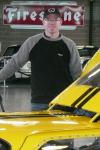 |
Administrator

|
|
|
Join Date: Jan 1999
Location: Duvall,
Wa
Cobra Make, Engine: KMP286, Shelby 482, Webers, 593HP
Posts: 4,162
|
|

 Not Ranked
Not Ranked
Looking at the members list, I see about equal numbers with folks having 482 and 496 FE's. About 10-15 of each.
|

06-03-2006, 05:43 PM
|
 |
Senior Club Cobra Member

|
|
|
Join Date: Jan 2005
Location: saratoga,
ca
Cobra Make, Engine: Kirkham #185, Shelby Alloy 482; sold
Posts: 1,190
|
|

 Not Ranked
Not Ranked
Just curious, why don't folks leave them at 427 cu. in.?
__________________
Dave
|

06-03-2006, 05:52 PM
|
|
CC Member

|
|
|
Join Date: Feb 2004
Location: Outside Miami,
FL
Cobra Make, Engine: Several
Posts: 949
|
|

 Not Ranked
Not Ranked
 For 2¢, plain
For 2¢, plain
Bragging rights, mostly.
Inadequate self-worth, occasionally.
Illusions of grandeur, from time to time.
Vox Americanna, engineering excess, low seat time, Walter Mitty dreaming, first Cobra, Racer-X memories, limits testing, first big money, failure to listen, wretched excess, right of passage, etc.
And, of course, just for fun.
Hey, it is a fun car, isn't it?
__________________
"A free people ought not only to be armed and disciplined but they should have sufficient arms and ammunition to maintain a status of independence from any who might attempt to abuse them, which would include their own government."
George Washington
|

06-03-2006, 08:50 PM
|
|
Club Cobra Member

|
|
|
Join Date: Dec 2004
Location: Roslyn Heights,
ny
Cobra Make, Engine: CSX4819, 427 all aluminum
Posts: 76
|
|

 Not Ranked
Not Ranked
Rsimoes,
Stroke is 4.125 and bore is 4.310. 468ci's, just to add to the confusion.
Conrad
|

06-03-2006, 09:18 PM
|
|
Senior Club Cobra Member

|
|
|
Join Date: Jul 2002
Cobra Make, Engine:
Posts: 15,712
|
|

 Not Ranked
Not Ranked

Why don't they leave them 427's?
I mean after all, if 427 is good, 480 something MUST be better, ie, bigger is better is the American way! 
But actually the original bore\stroke numbers of the 427 side oilers were carefully thought out and chosen for specific 'race' inspired reasons. The basic equation of a 'good race motor' has ALWAYS been BIG bore in relation to a SHORT stroke. Porsche and Ferrari are two examples that to this DAY employ that reasoning. Short stroke means higher rpm potential. Higher rpm means more HORSE POWER while sacraficing 'torque'. While some say 'torque' is what wins races, I disagree, it's HORSE power that wins races, and history is filled with example after example.
Todays small engines (Honda and other 'ricers') are based on horse power, you simply can't get BIG torque numbers out of a tiny motor. 'Torque' is what the driver FEELS when first accellerating, it's TORQUE that pushes you back in the seat and makes you 'feel good'. 18 wheeler trucks have MASSIVE torque, but there kind of slow on the race track...
You want FAST? Go small block, short stroke BIG bore. You want 'feels awesome' BIG torque? Go with a LONG stroke, big cubes and smaller bore. To each his own. A 427 compared to a 500 plus incher is a much smaller AND POTENTIALLY faster motor!

|

06-03-2006, 09:26 PM
|
|
Senior Club Cobra Member

|
|
|
Join Date: Jul 2002
Cobra Make, Engine:
Posts: 15,712
|
|

 Not Ranked
Not Ranked
The argument has been made: Todays modern engines employ a smaller bore with a longer stroke than we have traditionally seen in the past. The 'theory' is that this combination makes more 'horse power' and is a 'revolution' in understanding what it really takes to make a modern engine 'better'.
To which I say, bull carp. The bores are smaller on todays engines because it's EASIER to control emmission requirements and the longer stroke improves potential gas mileage because of the better 'torque' curves possible.
But is this a 'faster' better motor? I don't think so! It's 'better' than old motors because the manufacturers are tweaking the computer control and fuel injection process' to MAKE it a 'better' motor. It would STILL make more horse power and be 'faster' IF they were bigger bore and smaller stroke 'tweaked' using modern technology, in my opinion!
|

06-04-2006, 01:31 AM
|
|
CC Member

|
|
|
Join Date: Feb 2006
Cobra Make, Engine:
Posts: 283
|
|

 Not Ranked
Not Ranked

Bore and stroke are kinda irrelevant directly. Indirectly, bore affects how big the valves are and how close they are to the cylinder walls. Stroke affects displacement, friction (rings to cylinder wall), stress on rotating parts.
Horsepower is the deciding factor. But not the peak...the area under the curve. Since power coming out of the turns counts more than the end of the straight, power at the bottom of the used rev range counts a little more.
In many engines, the peak torque is close to the bottom of the rev range (typically 35-45% less than the peak engine speed) so traditionally has been a decent indicator. But this has been misunderstood into a common misunderstanding which sees print to often. When the legend becomes fact, print the legend. (Trivia question: who in 1492 thought the world was flat?)
Building a motor to the same rules, a 496 beats a 482 beats a 468 beats a 427. Modern big blocks come in size like 572, 632, and 675. I think I saw an ad for an 802 the other day. Race motors with less are built to strict rules.
The author whats to know how FE owners picked your bore and stroke, if the parts were readily available, and how driveable it is (rather than raceable).
Just a note: a SCAT kit for a 428 stroked to 462--cast crank, H-beam rods, Mahle pistons, with rings and balance--is around $1800. Not sure of availability. A 427 block and a change of pistons would make it a 482 or 496.

|

06-04-2006, 01:51 AM
|
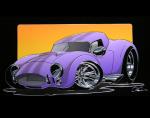 |
CC Member

|
|
|
Join Date: Oct 2004
Location: La Habra Ca.,
Ca
Cobra Make, Engine: Hi Tech Cobra Contemporary Cobra
Posts: 603
|
|

 Not Ranked
Not Ranked
What'sa Cobra, I think you nailed it.
__________________
'"An appeal to arms and the God of hosts is all that is left us. But we shall not fight our battle alone. There
is a just God that presides over the destinies of nations. The battle sir, is not to the strong alone. Is life so dear or peace so sweet as to be purchased at the price of chains and slavery? Forbid it almighty God. I know not what course others may take, but as for me, give me liberty, or give me death."' Patrick Henry.
|

06-04-2006, 08:02 AM
|
 |
CC Member

|
|
|
Join Date: Jul 2000
Location: Las Vegas,
NV
Cobra Make, Engine: 427 SC
Posts: 1,076
|
|

 Not Ranked
Not Ranked
Because building the 482 or 496 really doesn't cost anymore than a 427. I think Shelby charges $500 for the big bore cylinders, and on a $20k engine thats peanuts.
Quote:
|
Originally Posted by 4pipes
Just curious, why don't folks leave them at 427 cu. in.?
|
__________________
kris kincaid

|

06-04-2006, 09:03 AM
|
|
CC Member

|
|
|
Join Date: Feb 2006
Cobra Make, Engine:
Posts: 283
|
|

 Not Ranked
Not Ranked
Quote:
|
Originally Posted by Specialk
Because building the 482 or 496 really doesn't cost anymore than a 427. I think Shelby charges $500 for the big bore cylinders, and on a $20k engine thats peanuts.
|
And in 2006, 427 is a small block and 500+ is a big block.
There wouldn't be anything wrong with a 4.375 or 4.5 stroke. I imagine many (most?) people would use them if the cranks and pistons were readily available.
And just to make things interesting, Crower is listing a 4.375" stroke FE crank in their on-line inventory.
Last edited by DavidNJ; 06-04-2006 at 09:22 AM..
|

06-04-2006, 09:19 AM
|
|
Banned

|
|
|
Join Date: Jan 2003
Cobra Make, Engine:
Posts: 1,085
|
|

 Not Ranked
Not Ranked
Quote:
|
Originally Posted by 4pipes
Just curious, why don't folks leave them at 427 cu. in.?
|
People don't leave them at 427 for the following reason:
1) The bore comes already bigger than the original bore, so to get it to 427 (actually 425, which was what the original 427 really was) you would have to order customer cylinder liners and a very small stroke.
2) More cubes, easier to get more power
I asked the exact same question to Genesis and to Shelby. . . |

06-04-2006, 09:24 AM
|
|
Banned

|
|
|
Join Date: Jan 2003
Cobra Make, Engine:
Posts: 1,085
|
|

 Not Ranked
Not Ranked
Quote:
|
Originally Posted by rsimoes
Shelby Aluminum FE Block Owners - What bore and stroke did you choose. . . and what power and torque numbers do you have?
What does your torque curve look like?
What torque are you making at 1500-4000 RPM?
What brand of crank do you have?
How hard was it to get?
If you had to do it over again, what would you change?
Thank you!
|
Thanks for the feedback, but these are the questions that I am trying to get answers to. Also, is a 4.5 stroke on the FE really a bad idea? |

06-04-2006, 09:25 AM
|
|
Senior Club Cobra Member

|
|
|
Join Date: Jul 2002
Cobra Make, Engine:
Posts: 15,712
|
|

 Not Ranked
Not Ranked
As far as the original iron blocks go it's just easier and cheaper to locate a 428 crank than it is to locate a good 427 crank. The 428 crank has a longer stroke, which many prefer, and raises the cubes to around 450 cid.
Myself I would have prefered the original 'short stroke' 427 crank as it is better suited to high rpm and will 'build rpm' quicker than a 428 crank. But I don't turn my engine over 6400 rpm anyway, so 428 is fine and the added cubes are nice to have.
BIG bore, short stroke would be my ideal setup.
|

06-04-2006, 10:45 AM
|
|
CC Member

|
|
|
Join Date: Feb 2006
Cobra Make, Engine:
Posts: 283
|
|

 Not Ranked
Not Ranked
Why would a short stroke 'build rpm' better than a long stroke?
For example, Honda, Toyotas, M3s, etc. are all under square 8000rpm street, 10k race motors. The limitation may be that heads, cam, and intake designed for a 6500rpm 427, may only support a 6000rpm 496.
|

06-04-2006, 11:32 AM
|
|
Senior Club Cobra Member

|
|
|
Join Date: Jul 2002
Cobra Make, Engine:
Posts: 15,712
|
|

 Not Ranked
Not Ranked
Build rpm 'better'? Faster is the key word. Generally speaking, from a physics stand point (object in motion, etc.) a short stroke has the potential to reach max rpm quicker than a long stroke. Of course many other factors come into play as well, but it's hard to beat 'physics'! 
Take two engines identical in every way, EXCEPT one is small bore long stroke, the other BIG bore. I'll put my money on the short stroke based motor everytime.
You really see this principle at work on small motors, like motorcycle engines. Generally speaking (again) there ALL big bore short stroke machines.
Some of the great motors of 'yesteryear' were square. I believe the Chevy 283 V8 was such a motor.
Last edited by Excaliber; 06-04-2006 at 11:38 AM..
|

06-04-2006, 11:40 AM
|
|
CC Member

|
|
|
Join Date: Dec 2001
Location: Louisville,
KY
Cobra Make, Engine: I'm Cobra-less!
Posts: 9,417
|
|

 Not Ranked
Not Ranked

Hondas, Toyotas, M3's, etc. are not swinging 4" and 4.5" stroke cranks....nor do they have 4" or 4.25" bores. That's not really a valid comparison. None of those are 8 cylinder engines....and none are swinging the weight that a nicely sized V8 has to swing.
You're right about the heads, cam, and intake not supporting enough flow for a higher inch motor.
However, with flow rates and volumetric requirements all being the same, there is a cap on rotational velocity and rotational acceleration with longer stroke engines.
Compare these two engines:
A Nextel Cup engine. 4.125" Bore, 3.3" Stroke.
One of the FE's we were talking about. 4.310" Bore. 4.5" Stroke.
Do you honestly think that if you could supply the FE with an equivilent head/cam/intake package as the NC engine has....that it would make horsepower, much less survive, at 9000 rpm's?
You've heard the NASCAR guys free rev their engines.....you think you could make that 4.5" stroke (with the undersquare bore) engine rev that quickly? Highly unlikely.
I suppose you could model it by looking at a figure skater. What happens when they're doing their axials and they stick their arms out? They automatically slow down. When they tuck their arms back in, they spin faster.
Basically same principle. They are spinning weight either further out away from their body, or close to their body.
I guess if you wanted to bring some physical formulas in it you could....
angular velocity = tangential velocity / radius
You can see by the formula that as the radius approaches zero, angular velocity increases.
You can also see this by attaching a ball at the end of a string and swinging it around over your head. Swing it as fast as you can. Now shorten the string and watch the rotational speed of the ball increase.
Last edited by blykins; 06-04-2006 at 11:48 AM..
|

06-04-2006, 01:09 PM
|
|
CC Member

|
|
|
Join Date: Apr 1999
Location: cleveland,
OH
Cobra Make, Engine: CSX4000, 427
Posts: 1,999
|
|

 Not Ranked
Not Ranked

Quote:
|
Originally Posted by Excaliber
Why don't they leave them 427's?
I mean after all, if 427 is good, 480 something MUST be better, ie, bigger is better is the American way! 
But actually the original bore\stroke numbers of the 427 side oilers were carefully thought out and chosen for specific 'race' inspired reasons. The basic equation of a 'good race motor' has ALWAYS been BIG bore in relation to a SHORT stroke. Porsche and Ferrari are two examples that to this DAY employ that reasoning. Short stroke means higher rpm potential. Higher rpm means more HORSE POWER while sacraficing 'torque'. While some say 'torque' is what wins races, I disagree, it's HORSE power that wins races, and history is filled with example after example.
Todays small engines (Honda and other 'ricers') are based on horse power, you simply can't get BIG torque numbers out of a tiny motor. 'Torque' is what the driver FEELS when first accellerating, it's TORQUE that pushes you back in the seat and makes you 'feel good'. 18 wheeler trucks have MASSIVE torque, but there kind of slow on the race track...
You want FAST? Go small block, short stroke BIG bore. You want 'feels awesome' BIG torque? Go with a LONG stroke, big cubes and smaller bore. To each his own. A 427 compared to a 500 plus incher is a much smaller AND POTENTIALLY faster motor! |
The Ford 427 is actually 426 cubic inches. Ford basically took the FE block and put the biggest bore possible in it, still with a full water jacket, and the stroke was what they were already using for the 390 / 406. 7 liter displacement was the limit imposed by Nascar, which is why Mopar had a 426 and chevy had a 427. Ford called their new 426 a 427, because Mopar had already taken the 426 name and promoted it. I don't think there was alot of engineering in coming up with the exact bore / stroke numbers.
Horsepower is torque X rpm's. Torque is a measure of engine displacement and engine volumetric efficiency/mechanical efficiency. A normally aspirated small engine can never have big torque numbers because it cannot consume large volumes of fuel per revolution.
When you say low end torque puts you back in your seat, it's actually low end HP that puts you back in your seat. If your accelerating at any rpm, you're feeling both torque and HP.
A while back, Hot Rod did a comparison of a small bore long stroke BBC and a big bore short stroke BBC, same displacement, using the same heads, cam, intake, etc, and ther was real no difference in torque / HP up to I think 7000 rpms where the test ended.
I think the key advantage to a bigger bore is the bigger valves you can use, better flow, to make the engine run more efficiently at higher rpms, ie, more high rpm torque and HP. I don't think ther is any magic in a particular bore/stroke assuming everything else is the same. Can-Am cars ran stroked fuel injected 454 chevy's.
Increasing the displacement of any engine, keeping all other factors the same, will lower the rpms of max torque and HP, but the curve will cover more area under the larger engine, and the larger engine will out power the smaller engine at every rpm. Give me the 500, unless you want to stay original.
__________________
"After jumping into an early lead, Miles pitted for no reason. He let the entire field go by before re-entering the race. The crowd was jumping up and down as he stunned the Chevrolet drivers by easily passing the entire field to finish second behind MacDonald's other team Cobra. The Corvette people were completely demoralized."
|

06-04-2006, 01:17 PM
|
|
CC Member

|
|
|
Join Date: Feb 2006
Cobra Make, Engine:
Posts: 283
|
|

 Not Ranked
Not Ranked

What Anthony said.
This has been discussed extensively on various engine forums. If there is no displacement limit, engine builders stroke (and bore) as far possible. It always makes more power. Which accelerates faster.
The inertia in the rotating assembly is minimal, something on the order of 4-6lb-ft even from a big block. At 6500rpm we are talking maybe 5-10hp. The flywheel/clutch assembly may bave 2-3 times the inertia.
Yes, if displacement is fixed, a big bore/short stroke will allow bigger valves for better breathing and some less stress on the rod cap and bolts. However, if you are in the rev range of street Cobra, those stresses aren't a limiting issue. And for a street Cobra (or any Cobra not in a organized racing class), displacement isn't limited.
For the record, NASCAR and F1 are both displacement and bore limited by the rules. And 4.5 and larger are standard big block Chevy stroke sizes. Here, we are keeping the bore constant and the discussion is between more stroke and displacement vs less stroke and less displacement.
For the Cobra the big thing seems to be cost and availablity. 4.25 cranks and matching pistons for BBC rods are a (relatively standard item). 4.375 and 4.5 seem to be custom items.

|
 Posting Rules
Posting Rules
|
You may not post new threads
You may not post replies
You may not post attachments
You may not edit your posts
HTML code is Off
|
|
|
All times are GMT -7. The time now is 10:28 AM.
|




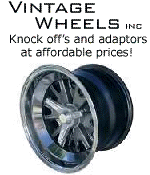



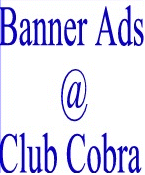

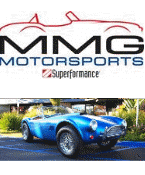


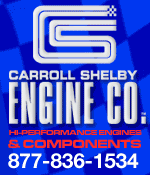









 Linear Mode
Linear Mode



